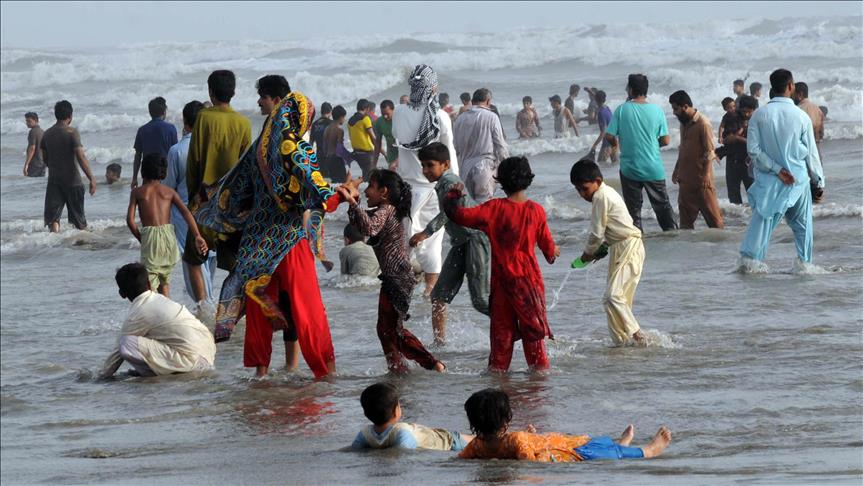Pakistan: Drowning incidents taint Karachi city beaches
At least 33 people, including women and children have drowned in just 1 month at Karachi’s beaches off Arabian Sea
 FILE PHOTO
FILE PHOTO
By Aamir Latif
KARACHI, Pakistan
Karachi, a city of 15-million people, has long been the poster child for political instability and violence, but it has one crowning jewel that sets it apart from all other Pakistani cities: its long stretches of beaches that provide a respite to all, no matter what social background or ethnicity one may belong to.
Its famous beaches like Hawksbay and Sandspit have for generations provided relief from the scorching heat to millions of people, but lately here too horrific tragedies are unfolding due to a lack of adequate number of lifeguards and proper safety measures.
On Sept. 9, under a hot midday sun, Shoiab Shibli and his friends and family were enjoying the cool seawater at Hawksbay beach despite the rough waves.
The cheering mood, however, ended abruptly when a high-rise wave suddenly swept away his brother prompting other family members to rush into the sea to save him.
But the rescue effort ended in a greater tragedy. Within minutes, 12 members of his family, including seven nephews and two nieces were swept away by more strong waves.
“I ran here and there screaming for help. But there were no lifeguards or any other help [available] to rescue them,” Shibli, a resident of Karachi’s northern district, told Anadolu Agency.
“I cannot forget that scene. My family members drowned one after another in front of my own eyes, and I could not do anything for them,” the 45-year-old, who owns a small business, said with tears rolling down his cheeks.
Among the victims were four young sons of Shibli’s elder sister.
“I don’t think I will ever go to the beach for the rest of my life,” he said.
Bashir Khan, a friend of Shibli’s family and an eyewitness of the tragedy, said he had rushed to a nearby village of fishermen, who were good swimmers, urging them to help.
Swimming into danger
“They immediately rushed to the scene but the sea had already thrown out eight bodies,” Khan said. The remaining four bodies were later pulled out by divers.
Hawksbay and Sandspit are hotspots for drowning incidents especially during the monsoon season -- June, July and August -- when the sea turns rough.
On Aug. 26, three Saudi nationals, including the son of a Saudi diplomat in Karachi, lost their lives at Hawksbay.
In August 2014, at least 46 picnickers drowned at different beaches off the Arabian Sea during Eid holidays despite being supposedly warned against swimming during high tides.
The government says it bans swimming at the beaches during the months; however, picnickers often ignore their warnings.
“These two sites have turned out to be killer beaches for the citizens of Karachi in recent years,” Saad Edhi, a spokesman for Edhi Foundation, a non-government organization involved in charity and emergency services, told Anadolu Agency.
Edhi said some 33 people had drowned while picnicking during the last one month at the two beaches. “That’s more than one death per day.”
According to Edhi, the two beaches in Karachi are not fit for swimming, and, therefore, should be closed to public.
“There are underwater ditches at Hawksbay and Sandspit. The picnickers often fail to judge these ditches, and slip into them,” Edhi said.
Lack of lifeguards, facilities
“The heavy undercurrent does not let them come out of these ditches.”
Lack of watchtowers and lifeguards capable of administrating emergency treatment often add to the casualties.
According to Karachi Mayor Syed Wasim Akhtar, there are only 30 designated lifeguards for the city’s 27 kilometer (17-mile) long beaches that simply cannot cater to thousands of picnickers on any given day.
While an emergency response center operates at Hawksbay, it lacks even basic facilities. One out of only two speedboats for rescue missions is operational, an official at the center, who asked not to be named due to concerns for his job, told Anadolu Agency.
A few life jackets were seen hanging at the center’s crumbled walls along with a couple of out-of-order oxygen tanks.
“Practically, only 18 to 20 lifeguards are available at a time to deal with any emergency situation along 27-kilometer long beaches. And yet the government and the people still expect miracles from us,” the official at the center said.
“The government does not pay heed towards this serious issue despite repeated reminders and requests. Sometimes, it does not even pay our salaries on time,” he added.
Karachi’s Chief Fire Officer Tahseen Ahmad also pointed out the severe shortage of lifeguards.
“We need more,” Ahmad told Anadolu Agency but declined to say further about what stops the government from hiring more lifeguards.
Anadolu Agency website contains only a portion of the news stories offered to subscribers in the AA News Broadcasting System (HAS), and in summarized form. Please contact us for subscription options.


